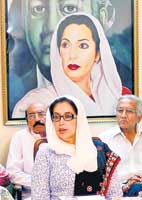
Benazir Bhutto’s gambleAs the initial shock of the terrorist attacks against Pakistani opposition leader Benazir Bhutto fade, it is becoming clear that they were a political boon for her, triggering a wave of public sympathy that extends well beyond her local Sindh stronghold. Yet despite this, Bhutto is finding it hard to convert this changed public mood into increased political support. Bhutto, the head of the Pakistan People's Party, needs all the support she can find after returning from exile. Her decision to form an alliance of convenience with Pakistan's unpopular military ruler, Pervez Musharraf, continues to undermine her claim to be a restorer of democracy and champion of the street. The deal has lent greater public legitimacy to Musharraf, who will share some of the power he has monopolized. Yet there is little love and even less common policy between the two.
In theory, the suicide attacks against Bhutto should have brought them closer together. After all, Islamic militants have repeatedly tried to assassinate Musharraf. Instead, Bhutto accused members of Musharraf's own party, the Pakistan Muslim League (Q), and his government of playing a role in the attack. "It remains a point that neither federal minister Ijazul Haq nor PML-Q President Chaudhry Shujaat was ever attacked by suicide bombers," she said. Shujaat, only half-jokingly, returned the favour by calling her a terrorist. Musharraf denounced her statements. Bhutto and Musharraf implicitly agree that Pakistan's other democratic leader, Nawaz Sharif, should be kept in exile in Saudi Arabia until after the general election in January. But skewing the election in this manner hurts Bhutto more than Musharraf, reinforcing the sentiment that she is a stooge of the military, and that Sharif is the real democratic leader. This reinforces her need to maintain distance from Musharraf. Almost everyone agrees that theirs is less a political alliance than a shotgun wedding. Much of the shotgun's ammunition comes from the United States, which perceives keeping the military in power as being necessary for the short-term battle against the new Taliban groups. However, America also believes that rolling back popular support for Islamic fundamentalism in the long term requires a legitimate democratic government. Islamic parties have tended to benefit electorally when the democratic parties are politically hobbled. The US hopes to get the best of both worlds. But it runs the risk of getting the worst of each: a civilian leader without legitimacy coupled with a military leader too weak to fight the Islamic militants who virtually rule the tribal areas near Afghanistan. Likewise, Bhutto's ability to play the Musharraf card and still maintain public support is fragile. A poll by the International Republican Institute in August showed that 47% of Pakistani voters supported a Bhutto-Musharraf alliance, with 37% opposed. Notably, nearly a third of Bhutto's own party opposed such a deal. Musharraf's recent farcical reelection as president probably cost Bhutto support. The terrorist attacks and her response - attacking Musharraf's party, visiting the wounded in hospital, and offering to pay for their medical care - have probably earned some of it back. The question now is: can she keep it? One concern for Bhutto is the role of the judiciary, which has no love for Musharraf. Their acquiescence in Musharraf's re-election, however, appears to confirm rumours that the judges have come to terms with the generals. The wild card is the increasingly savage war between the Pakistani state and the Islamic militants who have established a de facto independent state - a so-called 'Al Qaedastan' - straddling the Pakistan-Afghanistan border. The army is losing dozens of men every week and facing growing disciplinary problems from its Pashtun ethnic soldiers, who hail from the border region. The militant response has been suicide bomb attacks in the urban centers of the Pakistani heartland. But the attacks have not led the public to rally against Islamic militancy. A poll by Terror Free Tomorrow in September showed that Osama bin Laden, the Taliban, and local Islamic militants received approval ratings either equal to or higher than Musharraf. There is no approval for the escalating suicide bomb attacks. But so far, Pakistanis have tended to view the violence as an unnecessary and avoidable result of Pakistan's involvement in the US-led "war on terror." This has already taken its toll on Musharraf. If it undermines Bhutto's popularity, she may come to rue her deal with the general as a Faustian bargain. The greater danger is that any Pakistani government needs greater legitimacy to wage the intensifying war against 'Al Qaedastan.' By acceding to Musharraf's desire to keep Sharif on the political margins, the US has left itself with few options if the Bhutto-Musharraf alliance fails to produce a government acceptable to Pakistanis. At the same time, Bhutto always remembers that her father's attempts to play politics with the army eventually led to his death at the generals' hands. (Pramit Pal Chaudhuri is an International Council member of the Asia Society.) Copyright: Project Syndicate/Asia Society, 2007. Exclusive to The Sunday Times |
|| Front
Page | News | Editorial | Columns | Sports | Plus | Financial
Times | International | Mirror | TV
Times | Funday
Times || |
| |
Reproduction of articles permitted when used without any alterations to contents and the source. |
© Copyright
2007 | Wijeya
Newspapers Ltd.Colombo. Sri Lanka. All Rights Reserved. |
